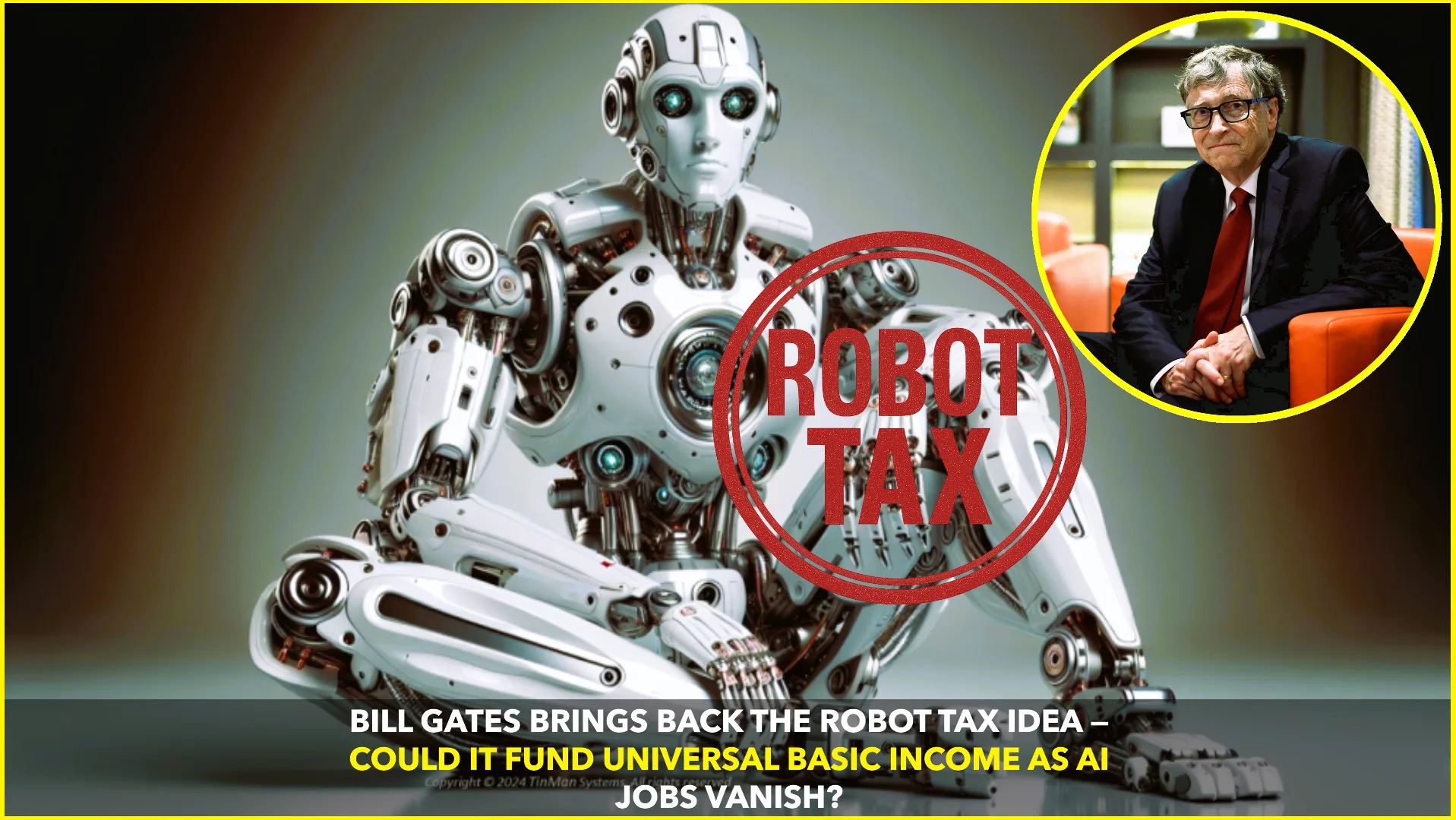In a world rapidly transformed by artificial intelligence, Bill Gates has reignited one of his most debated economic ideas — the “robot tax.” Originally proposed in 2017, the concept is gaining new attention as AI systems replace human labor across industries. Gates’ core idea: companies using robots or AI in roles that once required people should pay taxes comparable to payroll contributions.
When he first floated the proposal, automation was seen as a future concern. But in 2025, with AI displacing workers in manufacturing, logistics, customer service, and even white-collar jobs, the idea feels urgently relevant. Gates recently revisited this notion in discussions surrounding the societal cost of automation, suggesting such a tax could help fund Universal Basic Income (UBI).
In 2017, Gates told Quartz that governments should tax companies when robots replace humans, arguing that such taxes could fund programs for retraining displaced workers or supporting social services (Quartz, 2017). He emphasized that if a human worker pays income tax, and a robot replaces that job, it makes sense to collect similar revenue from automation.
Fast forward to today — the acceleration of generative AI, robotics, and automation has reignited this debate. According to Business Insider, Gates recently highlighted how automation-driven inequality demands a modern fiscal approach, saying robot taxation could “balance efficiency with equity” (Business Insider, 2025).
From Vision to Policy Debate
In his Netflix documentary series What’s Next? The Future With Bill Gates (2024), the Microsoft co-founder expanded his earlier stance, suggesting that UBI could reduce long-term poverty costs, such as the United States’ $1 trillion annual expense linked to child poverty. Gates argued that investing in social safety nets now could save trillions in the future (Netflix, 2024).
Gates’ earlier skepticism toward UBI has softened over time. During a 2017 Reddit AMA, he remarked that the U.S. wasn’t rich enough to sustain UBI yet — but by 2024, he began viewing it as a potential necessity in a highly automated economy (Reddit AMA, 2017).
The Broader Economic Picture
AI adoption has surged globally, with studies suggesting up to 300 million jobs could be affected by automation over the next decade. While this transition boosts productivity and profit, it also poses serious fiscal challenges — especially as payroll-based tax revenues shrink. A robot tax could provide a compensatory mechanism to maintain social welfare budgets.
Economists at the Massachusetts Institute of Technology have explored the idea, finding that modest robot taxes — between 1% and 3.7% of the robot’s value — could slow income inequality without stifling innovation (MIT News, 2022). Their research suggests balancing technological growth with social stability requires smart taxation rather than blanket bans or unchecked automation.
However, major industry voices oppose Gates’ suggestion. The International Federation of Robotics (IFR) argues such a tax would discourage innovation and penalize productivity gains, warning that “robots create more jobs than they destroy” by making companies globally competitive (IFR, 2023).
Implementation Challenges
Beyond the moral and economic debate lies a technical hurdle — how do we define a “robot”? Would automated software that replaces administrative or creative work qualify? What about AI systems like ChatGPT or self-driving delivery drones? These gray zones make the legislation difficult to enforce.
Some policymakers propose taxing profits derived from automation, rather than robots themselves, to ensure fair contribution without discouraging innovation. This approach might be easier to administer, aligning taxation with actual corporate gains from AI deployment.
Meanwhile, progressive economists have connected the robot tax debate to the larger discussion about redistributing AI-generated wealth. If AI drastically increases productivity, even a small tax on its profits could fund universal income models. In theory, this could form a self-sustaining system where automation pays for its own social impact.
A 2025 ArXiv study estimates that if AI becomes several times more productive than today’s models, UBI programs could become financially viable through automation-driven revenue alone (ArXiv, 2025).
The Road Ahead
Whether Gates’ robot tax proposal becomes law remains uncertain. Still, its revival reflects growing concern about the societal balance between technology and humanity. As nations struggle to manage job displacement and income inequality, Gates’ call for a robot tax offers a potential blueprint for a more equitable AI economy.
In the end, the “robot tax” is less about punishing innovation and more about reimagining how societies fund fairness in an automated world. It’s a question of redistribution — ensuring technology’s gains serve everyone, not just those who own the machines.










